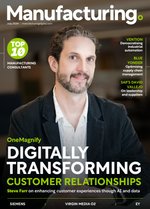
Tim Gaus
Smart Manufacturing leader and principal at Deloitte Consulting
Tim Gaus is the Smart Manufacturing leader and principal at Deloitte Consulting, with more than 25 years of supply chain experience and a focus on value chain optimisation, using emerging technology. Tim has had a diverse range of experiences at Deloitte, including leading supply chain transformations and strategies, manufacturing optimisation, supply chain planning and IoT in the development of modernised factories – all with an emphasis on helping their clients advance their modern manufacturing capabilities. He previously led Deloitte’s US Supply Chain Retail and Consumer product practice and carries these experiences with him in his current role.
Hello Tim! What makes a good leader?
In my experience, a good leader must be intellectually curious, create a culture and environment that encourages collaboration and growth, balance risk-taking with accountability for results and bring a personal passion for the broader success of the organisation.
As manufacturing becomes more technical, what skills should organisations recruit and train for?
The manufacturing landscape is maturing into a technology-driven field, requiring a new method of technology-driven training. What once was workable for legacy manufacturers in recruiting and upskilling is now outdated, and the next-generation workforce is hungry for opportunities to work with advanced technologies. Manufacturers must successfully embrace the collaborative workforce cultures of the past while deploying emerging technologies that create an integrated, interconnected ecosystem of diverse workers and technology in a workplace that spans digital, physical and virtual environments to win in this new landscape.
Specific skills organisations should recruit and train to build this modernised talent ecosystem include R&D, robotics, human interaction with GenAI and adaptability to an ever-advancing environment. Companies can leverage AI tools to screen for the best candidates while they focus on building their always-on upskilling programmes. While companies must focus on recruiting this digitally-driven generation of talent, it’s equally as important to upskill that talent through investment in technology resources for growth opportunities, to foster an empowering work environment.
How can adaptation of emerging technologies on factory floors make manufacturing roles more attractive to young talent?
The use of emerging technologies, such as AI and GenAI, on factory floors can attract young talent, as Gen Z especially has an expectation that the workplace will deploy the latest technologies. This, in combination with Gen Z being more adaptable to new technology, fosters new value to emerging tech as a talent acquisition tool. Emerging technology can supplement workers’ experience and expertise, making roles more appealing and therefore allowing businesses to better reach a talent pool of top-notch digital natives. This creates an empowered workforce that is focused on diverse, value-driving work. It's all about giving next-generation workers the next-generation technology they want to use for projects and personal development.
How can an integrated approach between human workers and technology lead to improved KPIs such as time to market, quality control and more accurate demand planning?
Amid rapid digital advancement, it’s critical to not lose sight of the human element of manufacturing. The integration of advanced technology into day-to-day activities enhances the value that is driven in measurable ways, often by removing the human from certain elements of decisions where technology is better suited and utilising the worker for uniquely human tasks. Doing so allows organisations to respond to variable demand faster in supply chains and coordinate digital and external contributors to optimise cost and talent needs. We still have a lot to learn when it comes to creating a digitally transformed approach. It’s critical for organisations to continuously monitor employee experience, their interactions with emerging technology, and upskilling progress to create an ever-advancing work environment.
Tell us about the importance of creating a workforce focused on value-driving, with technology that supplements workers’ experience and expertise.
It’s important to upskill existing and new talent to ensure new technologies are used to their full potential. The fundamentals of driving excellence in supply chain are broadly unchanged and the focus on driving value cannot be lost, however the toolset available with advanced technology amplifies and enhances the workforce’s expertise. We are entering a time where technology can capture and then democratise experience to rapidly enhance the effectiveness of all employees, including those more junior. This enables manufacturers to better prepare employees for future job roles, including those that require advanced digital and technical skills, and help build career pathways that motivate young talent. By upskilling young talent, they can train older workers in new areas, creating a two-way upskilling process and making the organisation more adaptable to change.
How can companies leverage digital tools and AI to attract talent and perform basic screenings to seek out higher-skilled workers?
Tools like AI are imperative in the modernised talent acquisition process to help create parameters for screening for new talent in both new and established manufacturing facilities. These tools can help to sense the local labour market and generate approaches for marketing to potential employees. As a result, manufacturers can increase their potential pool of higher-skilled workers and improve access to temporary labour for short-term projects.
Do you have any partnerships you can tell us about?
The Smart Factory by Deloitte @ Wichita, an immersive experience centre that brings end-to-end digital transformations to life, is breaking down barriers to build a diverse, equitable STEM workforce through its Smart Factory Believers programme. With our ecosystem of partners including AWS, Ballmer Group, Elenco, Siemens, National Math & Science Institute and Wichita State University, our mission is to provide STEM education opportunities for underserved communities. Our physical resources including a custom robotics kit – the Smart Rover kit – along with educational training and curriculum for teachers help build the manufacturing workforce of tomorrow. The programme offers unique opportunities for students who might otherwise be left out of the STEM pathway to gain economic mobility, tangible skills and confidence in themselves. To date, the programme has impacted more than 10,000 students in over 75 schools nationwide.
Can you share some statistics about your work?
Recently, Deloitte worked with a national aerospace launch services provider to help meet the rising demand of critical rocket hardware for commercial use. Prevailing thinking from the floor was that more machinery might be needed, when, in fact, existing machines were running well under capacity and could do the necessary work if run faster, continuously, with detailed schedules and added shifts of operators. In short, the answer was improving human capital and the culture at the organisation. The company could dramatically increase throughput—over 20x their previous production rate—at less than 10% of the originally budgeted cost.
What do the next 12 months hold for you and Deloitte?
This is an extremely exciting time for manufacturing. In the next year, we are anticipating the acceleration of technical innovation in manufacturing which we will continue to embrace and demonstrate in our own Smart Factory. The combination of multiple different styles of technology is quickly leading us toward manufacturing being software defined, and we will help our clients on their journey to creating scaled efficiencies across the end-to-end of the value chain.
******
Make sure you check out the latest edition of Manufacturing Digital and also sign up to our global conference series - Procurement & Supply Chain 2024 & Sustainability LIVE 2024
******
Manufacturing Digital is a BizClik brand.
- Manufacturing & Mobility LIVE: Beatriz Gutierrez KeynoteSmart Manufacturing
- Manufacturing & Mobility LIVE: The Future of AIAI & Automation
- Deloitte: The Key to Optimising Holiday Supply ChainsProcurement & Supply Chain
- Deloitte Shares 2025 Manufacturing Predictions & OutlookProcurement & Supply Chain


